Tales of a 21st Century Gypsy
April 7, 2005 Excursions: Boat to Qanater.
Every morning, dozens of gaily-painted boats fill with joyful young people and ply their way down the Nile to Qanater, an area of gardens just above the barrage, a 19th century
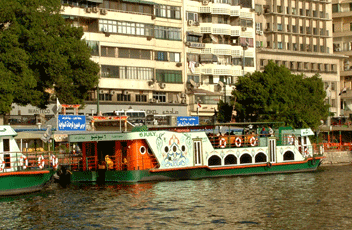
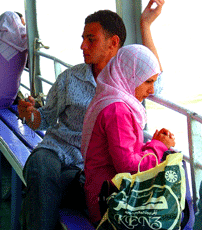
Tales of a 21st Century GypsyApril 7, 2005 Excursions: Boat to Qanater. Every morning, dozens of gaily-painted boats fill with joyful young people and ply their way down the Nile to Qanater, an area of gardens just above the barrage, a 19th century |
 |
 |
|
dam at the upstream end of the Delta. I’d wanted to take one of those boats for years. I love boats, and these only cost a few pounds for the two-hour ride. I’d walked past them many times as they were loading up, and watched groups of slim young men and headscarved young women singing and cheering on the deck, pounding on drums and dancing in a tight crowd to the heavy rhythm. I wanted to go on that boat myself, but I didn’t quite have the nerve to head out on my own. This weekend, though, I mentioned it to my colleague Dixie, and she was up for coming along. I called my friend Kathleen, and she and her partner John agreed to join us. We met on Thursday morning and headed out to the boat launch. We were wondering whether we’d fit in by the time we boarded the boat. We expected to be the only |
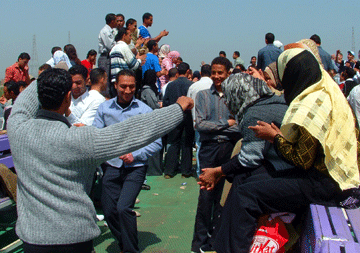 |
|
foreigners, but we didn’t expect to be older than everyone on the boat as well. This was clearly an excursion for young Egyptians, not families or grandparents. Kids – teenagers, twenty-somethings – crowded the boat, piled on the benches, perched on the backs of seats, drummed, sang, and danced in the aisles, men with men and women largely with women. We stayed below on the lower deck, out of the sun, and away from the crowds. No one stared at us, though we were the only foreigners on the boat. Indeed, no one paid attention to us at all, which was something of a relief – I’d expected we’d be a bit the center of attention simply because we were foreign. The boat ride was delightful. I like being on the water, and I love the feel of the wind rushing past me. As we left the dock, we were in familiar territory, cruising past my hotel, under the bridge below it, and up the stretch of river that I see from the 20th floor windows | ||
|
of my room. Kathleen pointed out her apartment building in Zamalek, we went past the Conrad hotel, under the railroad bridge and past the blue-towered Ministry of Water and Irrigation where I want for meetings last summer. We passed the row of smokestacks that are my indicator of air quality – if they are sharp on the horizon belching smoke in the morning, the air quality is good; if they are lost in haze, it is bad. Then we were on new ground – or in unfamiliar waters, more accurately. A big trash handling facility towered over us to the west, while small houses punctuated the grassy shoreline to the east. Occasionally we’d glide right past someone’s yard running down to the water, and see laundry flapping in the wind, cows grazing, even one time a camel tethered to a post. As we got farther from Cairo the air got better, and the freshness of water and greenery assailed us. Up on the top deck the party continued, but we mostly avoided it in the shade below. |
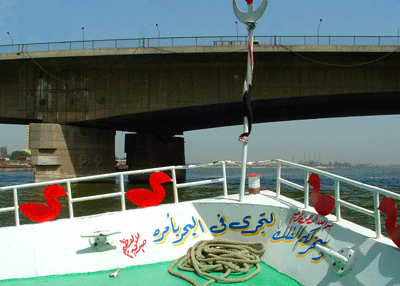 | |
|
The “gardens” at Qanater turned out to be something quite different, more like an amusement park than a garden. The road from the dock was lined with restaurants and cafes, each blaring loud music. Inside a few young people were dancing. On the street men sold candies and ice creams, and crowds of people walked up and down the road. Carriages passed us, drawn by tired and bedraggled horses with fly-infested sores on their bodies. The drivers stopped as they passed us, hoping that we could hire them to take us around the park. Men on horses galloped up and down the street, offering them for hire for a few pounds. At one point a line of | ||||||
|
horses passed, with young Egyptian girls on their backs, unsure of what they were doing up there but laughing all the same. The sun was hot and the din and crowds incessant. It wasn’t we had hoped for when we took the boat. We turned down a staircase into the yard of a set of government buildings, seeking an escape. We were followed by a tourist police officer, who wouldn’t leave us alone to wander through the area. He had to tell us where to do, what to do. We couldn’t shake him off. Kathleen speaks Arabic, and she was talking to him, but the rest of us were at a loss for what to do with him. We refused to talk to him, but he stuck with us, walking fifteen feet to our right wherever we went, and calling out directions from time to time. We made a sudden turn to the left and dropped him, but another one picked us up in his place. Walking alongside a garden with children’s rides, Dixie and I stopped to take some photos. The children saw us, and ran out to get in the pictures and talk to us. I felt like the Pied Piper, if I took three steps back, they took three steps forward, crowding around me and sticking their faces in front of my camera. They were fun, though, harmlessly happy kids who were amused to be near a foreigner. They wouldn’t stand far enough off for formal pictures – now I understand how people end up with those grinning pictures of children with their heads sticking right into the lens of the camera. The tourist police tried to shoo them away, but I made fun of the police in sign language and the kids came back laughing. In frustration I turned my camera on the tourist police instead of the children. “Le, le, memnu’a!” they cried – no, no, taking pictures of them was forbidden. It did make them keep their distance, |
| |||||
|
though. One young officer came back and asked my name. “Memnu’a, ismi” I told him, my name is forbidden. He laughed. Frustrated with the noise and annoyed by the persistent police, we escaped to a café by the water, one of the few without music. Quiet is relative, though – we were still blasted by the speakers next door. The police tried to sit down with us, but we firmly said no, only four chairs at our table. They sat twenty feet off, but at least they left us alone as we drank our sodas and chatted. I felt bad for |
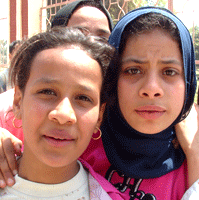 |
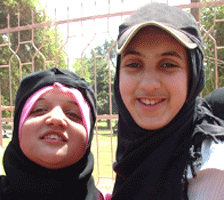 |
|
John and Kathleen, here I’d invited them, and the noise and the youth and the police had made the experience an unpleasant one for them. Well, I hadn’t known what to expect. It wasn’t quite my idea of fun either, but I didn’t mind so much. Chalk it up to a cultural experience. Frustrated with the noise and annoyed by the persistent police, we escaped to a café by the water, one of the few without music. Quiet is relative, though – we were still blasted by the speakers next door. The police tried to sit down with us, but we firmly said no, only four chairs at our table. They sat twenty feet off, but at least they left us alone as we drank our sodas and chatted. I felt bad for John and Kathleen, here I’d invited them, and the noise and the youth and the police had made the experience an unpleasant one for them. Well, I hadn’t known what to expect. It wasn’t quite my idea of fun either, but I didn’t mind so much. Chalk it up to a cultural experience. | ||
|
And the boat ride back was nice, even though we could smell the air getting worse as we approached Cairo. We took the first boat back, so it wasn’t so crowded. The later afternoon light was nice, the birds on the river were splendid. Great blue herons and cattle egrets and a hawk or two and terns and seagulls and mallards and brown birds that I didn’t recognize, all picking through the reeds in the river. Like the hippos in the bas relief at the pyramids, the birds have been there forever. They were there five thousand years ago to be carved on tomb walls, and they are still there today, despite all the changes in the people who watch them. Continue to the next entry. Return home. Unless otherwise indicated all text and photos on this site ©Joy E. Hecht. |
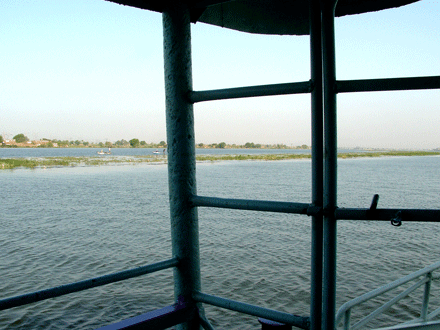 | |